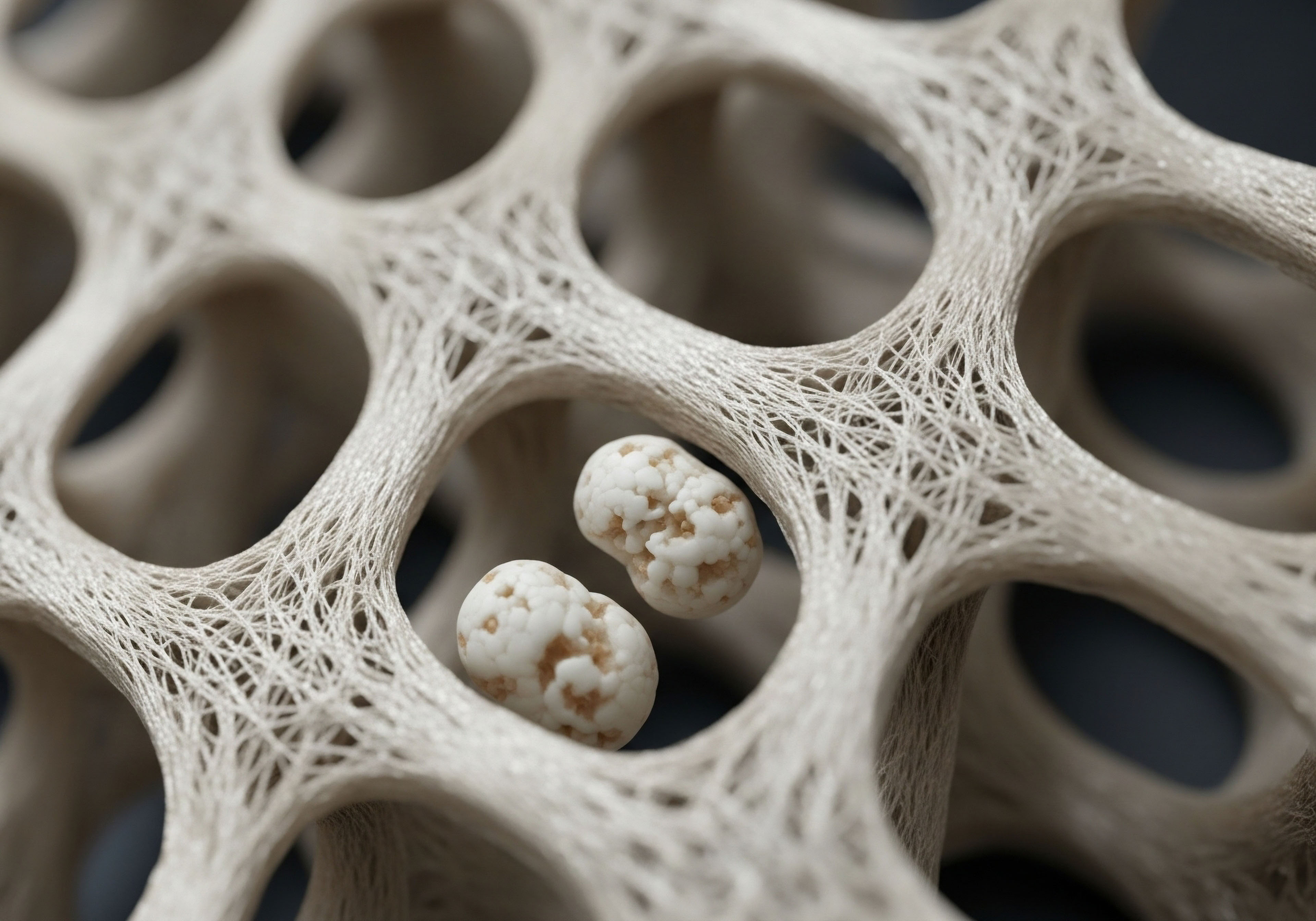

Fundamentals
Experiencing a decline in vitality, a subtle yet persistent shift in your physical and mental landscape, can feel disorienting. Perhaps you notice a persistent fatigue that no amount of rest seems to alleviate, or a diminished drive that once defined your days.
These sensations, often dismissed as simply “getting older,” frequently point to deeper biological recalibrations within the body’s intricate messaging systems. For many, these shifts are intimately connected to hormonal balance, particularly the levels of circulating testosterone. When considering the path of hormonal optimization, especially with a pre-existing heart condition, a careful, informed approach becomes paramount.
It is a journey of understanding your unique biological blueprint, recognizing that your heart and your endocrine system are not isolated entities but rather deeply interconnected components of your overall well-being.
The relationship between testosterone and cardiovascular health has been a subject of extensive scientific inquiry. Historically, some concerns arose regarding the safety of testosterone replacement protocols in individuals with cardiac issues. However, contemporary research provides a more nuanced understanding, suggesting that the picture is far from simplistic.
Low levels of endogenous testosterone have been linked to various adverse cardiovascular markers, including increased body fat, reduced lean muscle mass, and less favorable lipid profiles. Conversely, restoring testosterone to physiological ranges in individuals with documented deficiency may offer metabolic and cardiovascular benefits.
Understanding your body’s hormonal signals, particularly in the context of heart health, is a critical step toward reclaiming vitality.
The heart, a tireless pump, relies on a delicate balance of signals to maintain its rhythm and function. Hormones, acting as the body’s internal communication network, play a significant role in this balance. Testosterone, while primarily recognized for its role in male reproductive health, also exerts effects on cardiac muscle cells, blood vessels, and metabolic processes that influence cardiovascular function.
For individuals with a pre-existing heart condition, any intervention that impacts these systems warrants careful consideration and a thorough evaluation of potential benefits and risks.

The Endocrine System and Cardiac Function
The endocrine system, a network of glands producing and secreting hormones, acts as a master regulator for nearly every bodily process, including the cardiovascular system. Hormones influence heart rate, blood vessel tone, and even the structural integrity of cardiac tissue. Testosterone, an androgen, is present in both men and women, albeit in different concentrations, and its receptors are found throughout the cardiovascular system. This widespread presence suggests a direct role in cardiac physiology.
When testosterone levels are suboptimal, a condition known as hypogonadism, individuals may experience a range of symptoms that extend beyond sexual health, impacting energy levels, mood, and body composition. These systemic effects can indirectly influence cardiovascular health. For instance, low testosterone has been associated with increased insulin resistance, central adiposity, and dyslipidemia, all of which are established risk factors for cardiac disease. Addressing these underlying metabolic imbalances through targeted hormonal support can contribute to a more favorable cardiovascular profile.

Why Does Testosterone Matter for the Heart?
Testosterone’s influence on the heart is multifaceted. It can affect the vascular system by promoting vasodilation, the widening of blood vessels, which can improve blood flow and reduce the workload on the heart. This effect is thought to occur through mechanisms involving calcium channel blockade and potassium channel opening in smooth muscle cells lining the arteries. Additionally, testosterone may influence the heart muscle directly, impacting its contractility and efficiency.
Consider the analogy of a complex hydraulic system. If the fluid levels are too low, or the pipes are constricted, the pump must work harder, leading to inefficiency and potential strain. Hormones, including testosterone, help maintain the optimal “fluid levels” and “pipe diameter” within the body’s circulatory system. When these hormonal signals are out of sync, the entire system can experience stress. Understanding these foundational principles is the first step in navigating personalized wellness protocols with confidence.


Intermediate
Navigating the landscape of hormonal optimization, particularly when a pre-existing heart condition is present, requires a precise and individualized clinical strategy. The goal is to recalibrate the body’s internal systems to restore balance and function, always with a vigilant eye on cardiovascular safety. This section explores the specific protocols and considerations involved in testosterone replacement therapy for individuals with cardiac concerns, translating complex clinical science into actionable knowledge.
The decision to initiate testosterone replacement therapy (TRT) in men with a history of cardiovascular events or significant risk factors involves a careful weighing of potential benefits against potential risks. Recent large-scale studies, such as the TRAVERSE trial, have provided reassuring data regarding the overall cardiovascular safety of TRT in middle-aged and older men with documented hypogonadism and pre-existing or high risk of cardiovascular disease.
This research indicates that TRT was not associated with an increase in major adverse cardiovascular events compared to placebo in this specific population.
Individualized assessment and continuous monitoring are cornerstones of safe hormonal optimization in the presence of cardiac conditions.

Clinical Protocols for Men with Cardiac Considerations
For men experiencing symptoms of low testosterone who also have a pre-existing heart condition, a standard protocol often involves weekly intramuscular injections of Testosterone Cypionate. This approach allows for consistent dosing and predictable blood levels. However, the specific dosage and frequency are highly individualized, beginning with a conservative approach and adjusting based on clinical response and laboratory markers.
Beyond testosterone itself, a comprehensive protocol often includes additional medications to support overall endocrine health and mitigate potential side effects.
- Gonadorelin ∞ Administered via subcutaneous injections, typically twice weekly, this peptide helps maintain natural testosterone production and preserve testicular function, which is particularly relevant for men concerned about fertility.
- Anastrozole ∞ This oral tablet, usually taken twice weekly, acts as an aromatase inhibitor. It helps to block the conversion of testosterone into estrogen, which can be important for managing estrogen levels and reducing potential side effects associated with elevated estrogen, such as gynecomastia or fluid retention.
- Enclomiphene ∞ In some cases, this medication may be included to support the production of luteinizing hormone (LH) and follicle-stimulating hormone (FSH), further encouraging endogenous testosterone synthesis.
The timing of TRT initiation after a cardiac event, such as a myocardial infarction, is also a critical consideration. Guidelines suggest waiting approximately three to six months after such an event, ensuring the patient’s heart function has stabilized and they have completed cardiac rehabilitation. This waiting period allows for a comprehensive assessment of cardiac stability and a reduction in acute risks.

Monitoring and Risk Mitigation
Regular and thorough monitoring is indispensable when administering TRT to individuals with pre-existing heart conditions. This includes periodic assessment of various physiological parameters and laboratory markers.
A significant consideration is the potential for erythrocytosis, an increase in red blood cell count, which can occur with testosterone therapy. Elevated hematocrit levels can increase blood viscosity, potentially raising the risk of blood clots and subsequent cardiovascular events.
The following table outlines key monitoring parameters and their clinical significance:
| Monitoring Parameter | Clinical Significance | Frequency of Assessment |
|---|---|---|
| Testosterone Levels | Ensures therapeutic range is maintained, avoiding supraphysiological levels. | Initially 6-8 weeks after starting, then annually. |
| Hematocrit (Hct) | Detects erythrocytosis; levels above 50-54% warrant intervention. | Before treatment, 3-4 months, 12 months in first year, then annually. |
| Lipid Profile | Assesses impact on cholesterol and triglycerides, crucial for cardiovascular risk. | Regularly, as part of comprehensive cardiac risk assessment. |
| Blood Pressure | Monitors for hypertension, a known cardiovascular risk factor. | Regularly, as part of routine clinical visits. |
| Prostate-Specific Antigen (PSA) | Screens for prostate health, particularly in older men. | As per established guidelines for prostate cancer screening. |
While the TRAVERSE study found no increase in major adverse cardiovascular events, it did note a higher incidence of certain specific events, including atrial fibrillation, acute kidney injury, and pulmonary embolism, in the testosterone group. This highlights the need for vigilance and careful patient selection. Individuals with a history of thromboembolic events or paroxysmal atrial fibrillation may require particular caution or alternative strategies.

Testosterone Replacement for Women with Cardiac Considerations
Hormonal balance in women also plays a role in cardiovascular health, and low testosterone levels can contribute to symptoms that impact overall well-being. For pre-menopausal, peri-menopausal, and post-menopausal women experiencing relevant symptoms, such as irregular cycles, mood changes, hot flashes, or diminished libido, targeted hormonal support may be considered.
Protocols for women typically involve lower doses of Testosterone Cypionate, often administered weekly via subcutaneous injection. The dosage is significantly lower than for men, usually ranging from 0.1 to 0.2 ml. Additionally, Progesterone is prescribed based on menopausal status to support hormonal equilibrium. Pellet therapy, offering long-acting testosterone, may also be an option, with Anastrozole included when appropriate to manage estrogen conversion.
The interplay of sex hormones, including testosterone and estrogen, can influence cardiovascular risk in women. A higher ratio of testosterone to estrogen has been associated with an increased risk of cardiovascular disease in postmenopausal women. This underscores the importance of a balanced approach to hormonal optimization, considering the entire endocrine symphony rather than isolated hormones.

What Are the Specific Monitoring Parameters for Cardiac Patients on TRT?
The clinical decision-making process for individuals with pre-existing heart conditions receiving TRT is complex, requiring a collaborative approach between endocrinologists and cardiologists. The aim is to optimize hormonal status while minimizing any potential cardiovascular strain. This involves not only careful dosing and formulation selection but also continuous assessment of cardiac function and related biomarkers.
The benefits of TRT, such as improvements in body composition, insulin sensitivity, and lipid profiles, can indirectly support cardiovascular health. However, these benefits must be weighed against the specific risks for each individual, especially those with a history of cardiac events or conditions that might be exacerbated by changes in blood viscosity or fluid balance.


Academic
The intricate relationship between testosterone and the cardiovascular system represents a compelling area of scientific inquiry, particularly when considering therapeutic interventions for individuals with pre-existing cardiac conditions. Moving beyond general considerations, a deep understanding of the underlying biological mechanisms and the latest clinical trial data is essential for informed decision-making. This section delves into the sophisticated interplay of hormonal axes, metabolic pathways, and cellular functions that govern testosterone’s impact on cardiac health.
The notion of testosterone as a simple male sex hormone belies its widespread influence across various physiological systems, including the cardiovascular apparatus. Receptors for androgens are present in cardiomyocytes, vascular smooth muscle cells, and endothelial cells, indicating direct hormonal action on cardiac tissue and blood vessels.
The effects of testosterone are mediated through both genomic and non-genomic pathways. Genomic actions involve binding to intracellular androgen receptors, leading to changes in gene expression and protein synthesis, which can influence long-term cellular function and remodeling. Non-genomic actions, conversely, involve rapid effects on cell membranes and signaling cascades, such as calcium channel modulation and potassium channel activation, leading to immediate changes in vascular tone.
Testosterone’s influence on the cardiovascular system extends to cellular and molecular levels, impacting vascular tone and myocardial function.

Testosterone’s Direct Cardiac and Vascular Effects
Testosterone has been shown to exert direct vasodilatory effects on coronary arteries and other vascular beds. This vasodilation contributes to reduced peripheral systemic vascular resistance, which can decrease the workload on the heart and improve myocardial perfusion. Studies have demonstrated that testosterone can inhibit L-type calcium channels and stimulate potassium channel opening, leading to relaxation of vascular smooth muscle. This mechanism helps explain the acute anti-ischemic effects observed in some studies of men with coronary artery disease.
At the myocardial level, testosterone influences cardiac contractility and electrical signaling. While some research suggests that testosterone deficiency can impair myocardial contractility by reducing sarcoplasmic reticulum Ca2+-ATPase (SERCA2a) activity, other studies indicate that supraphysiological testosterone levels might be associated with cardiac hypertrophy and altered electrical signaling. The balance of these effects is crucial, underscoring the importance of maintaining physiological testosterone concentrations rather than aiming for excessively high levels.

Metabolic Interconnections and Cardiovascular Risk
The endocrine system operates as a finely tuned orchestra, where the dysfunction of one instrument can affect the entire symphony. Low testosterone is frequently associated with components of the metabolic syndrome, a cluster of conditions that significantly increase cardiovascular risk. These include:
- Insulin Resistance ∞ Testosterone plays a role in glucose metabolism and insulin sensitivity. Hypogonadal men often exhibit increased insulin resistance, which can lead to type 2 diabetes, a major risk factor for heart disease.
- Central Adiposity ∞ Reduced testosterone levels are linked to increased visceral fat accumulation, which is metabolically active and contributes to systemic inflammation and dyslipidemia.
- Dyslipidemia ∞ While the effects on lipid profiles can be mixed, some studies suggest that TRT can improve total and low-density lipoprotein cholesterol levels, although effects on high-density lipoprotein may vary.
- Hypertension ∞ The relationship between testosterone and blood pressure is complex and can be bidirectional. While some studies suggest an inverse relationship between endogenous testosterone and blood pressure, others indicate that high testosterone levels might be associated with increased blood pressure in certain populations.
Addressing these metabolic risk factors through appropriate hormonal optimization can yield systemic benefits that extend to cardiovascular health. The goal is to recalibrate the metabolic machinery, allowing the body to process nutrients more efficiently and reduce inflammatory burdens that contribute to atherosclerosis.

The TRAVERSE Trial and Beyond
The TRAVERSE study, a large, randomized, placebo-controlled trial, specifically investigated the cardiovascular safety of testosterone therapy in men with hypogonadism and pre-existing or high risk of cardiovascular disease. This FDA-mandated trial provided significant insights:
The primary endpoint, a composite of major adverse cardiac events (nonfatal stroke, death from cardiovascular cause, nonfatal myocardial infarction), showed no increased risk in the testosterone group compared to placebo. This finding offers substantial reassurance regarding the overall cardiovascular safety of TRT when administered to appropriately selected patients with documented hypogonadism.
However, the trial also identified higher incidences of certain specific adverse events in the testosterone group, including:
- Atrial Fibrillation ∞ An irregular and often rapid heart rate that can lead to blood clots, stroke, heart failure, and other heart-related complications.
- Acute Kidney Injury ∞ A sudden episode of kidney failure or kidney damage.
- Pulmonary Embolism ∞ A blockage in one of the pulmonary arteries in the lungs, often caused by blood clots that travel to the lungs from the legs.
These findings underscore the importance of careful patient selection, ongoing monitoring, and a thorough discussion of potential risks, especially in individuals with a history of thromboembolic events or conditions predisposing to arrhythmias. The observed increase in atrial fibrillation, while statistically significant, requires further investigation into its clinical implications and specific patient profiles that might be more susceptible.

Considerations for Specific Cardiac Conditions
The impact of testosterone on the heart can vary depending on the specific pre-existing cardiac condition.

Testosterone and Heart Failure
Low testosterone levels are common in men with chronic heart failure (CHF) and are associated with worse clinical prognosis, reduced exercise capacity, and increased mortality. While interventional studies on TRT in CHF patients have been somewhat inconclusive due to heterogeneity, some suggest beneficial effects on exercise capacity, metabolic health, and cardiac prognosis. Testosterone has been shown to augment cardiac output acutely in men with CHF. However, TRT is generally contraindicated in men with unstable and severe heart failure.

Testosterone and Coronary Artery Disease
Epidemiological studies indicate an inverse relationship between endogenous testosterone levels and the severity of coronary artery disease (CAD). Lower testosterone levels have been linked to premature CAD and unfavorable effects on cardiovascular risk factors. TRT has shown some anti-ischemic properties in patients with established CAD, with some studies reporting improvements in angina symptoms and exercise-induced ischemia.
However, concerns remain regarding its effect on coronary plaque volume, with one study suggesting an increase in non-calcified and total plaque volume with testosterone treatment.
The table below summarizes the reported effects of testosterone on various cardiovascular parameters, drawing from a synthesis of clinical and preclinical data:
| Cardiovascular Parameter | Observed Effect of Testosterone (Physiological Levels) | Clinical Implications |
|---|---|---|
| Vascular Tone | Vasodilation, reduced peripheral resistance. | Improved blood flow, reduced cardiac workload. |
| Myocardial Contractility | Potential improvement in deficiency states; complex effects at supraphysiological levels. | Enhanced pumping efficiency, but caution with excessive dosing. |
| Lipid Profile | Variable; some studies show improved total and LDL cholesterol, HDL effects inconsistent. | Potential reduction in atherosclerotic risk factors. |
| Insulin Sensitivity | Improved glucose metabolism and insulin action. | Reduced risk of type 2 diabetes and metabolic syndrome. |
| Erythrocytosis | Increased red blood cell production, potential for elevated hematocrit. | Requires careful monitoring to mitigate thromboembolic risk. |
| Arrhythmias | Higher incidence of atrial fibrillation noted in some trials. | Warrants vigilance, especially in patients with pre-existing arrhythmias. |
The scientific literature continues to evolve, providing increasingly refined insights into the precise mechanisms by which testosterone influences cardiovascular health. The current consensus supports the safety of TRT in appropriately selected hypogonadal men with stable cardiovascular disease, provided that treatment is carefully individualized and closely monitored. The interplay of hormones, metabolic health, and cardiac function is a testament to the body’s interconnected systems, and a comprehensive understanding is key to optimizing long-term well-being.

How Does Testosterone Influence Cardiac Electrical Signaling?
Testosterone’s impact on cardiac electrical signaling, particularly its association with arrhythmias, is a subject of ongoing investigation. Some studies suggest that low testosterone levels may be associated with a higher risk of ventricular arrhythmias due to a lengthening of the myocardial repolarization phase.
Conversely, the TRAVERSE trial observed a higher incidence of atrial fibrillation in men receiving testosterone therapy. This suggests a complex relationship where both very low and potentially supraphysiological levels, or even physiological replacement, might influence cardiac electrical stability in different ways. The precise mechanisms linking testosterone to atrial fibrillation require further elucidation, possibly involving direct effects on atrial tissue or indirect effects through changes in blood pressure or fluid balance.

References
- Basaria, S. et al. “Testosterone Replacement Therapy and Cardiovascular Risk ∞ A Review.” Therapeutic Advances in Endocrinology and Metabolism, vol. 6, no. 2, 2015, pp. 60-73.
- Lincoff, A. M. et al. “Cardiovascular Safety of Testosterone-Replacement Therapy.” New England Journal of Medicine, vol. 389, no. 2, 2023, pp. 107-117.
- Ory, J. et al. “Secondary Polycythemia in Men Receiving Testosterone Therapy Increases Risk of Major Adverse Cardiovascular Events and Venous Thromboembolism in the First Year of Therapy.” Journal of Urology, vol. 207, no. 6, 2022, pp. 1295-1301.
- Malkin, C. J. et al. “Testosterone replacement in hypogonadal men with angina improves ischaemic threshold and quality of life.” Heart, vol. 90, no. 8, 2004, pp. 871-876.
- Webb, C. M. et al. “Effect of acute testosterone on myocardial ischemia in men with coronary artery disease.” Circulation, vol. 102, no. 15, 2000, pp. 1906-1911.
- Jones, T. H. et al. “Testosterone and the Heart.” European Cardiology Review, vol. 14, no. 2, 2019, pp. 110-116.
- Traish, A. M. et al. “Testosterone and the Cardiovascular System ∞ A Comprehensive Review of the Clinical Literature.” Journal of the American Heart Association, vol. 2, no. 6, 2013, e000271.
- Kelly, D. M. & Jones, T. H. “Testosterone and cardiovascular risk in men.” Frontiers in Hormone Research, vol. 43, 2014, pp. 1-20.
- Corona, G. et al. “Testosterone and Cardiac Diastolic Function.” Journal of the American College of Cardiology, vol. 68, no. 4, 2016, pp. 431-432.
- Vigen, R. et al. “Association of testosterone therapy with mortality, myocardial infarction, and stroke in men with low testosterone levels.” JAMA, vol. 313, no. 10, 2013, pp. 1039-1047.
- Bhasin, S. et al. “Testosterone Therapy in Men With Hypogonadism ∞ An Endocrine Society Clinical Practice Guideline.” Journal of Clinical Endocrinology & Metabolism, vol. 103, no. 5, 2018, pp. 1715-1744.
- Rosano, G. M. et al. “Acute anti-ischemic effect of testosterone in men with coronary artery disease.” Circulation, vol. 99, no. 13, 1999, pp. 1666-1670.
- Petering, R. C. & Brooks, J. R. “Testosterone Therapy ∞ Review of Clinical Applications.” American Family Physician, vol. 96, no. 10, 2017, pp. 621-628.
- Ohlsson, C. et al. “Testosterone, sex hormone-binding globulin, and the incidence of cardiovascular disease in older men.” Journal of the American College of Cardiology, vol. 55, no. 16, 2010, pp. 1697-1704.
- Muraleedharan, V. & Jones, T. H. “Testosterone and coronary artery disease.” Journal of the American College of Cardiology, vol. 55, no. 16, 2010, pp. 1705-1707.

Reflection
As you consider the complexities of hormonal health and its interplay with cardiovascular function, remember that this knowledge is a powerful tool. It allows you to move beyond generalized assumptions and engage with your health journey from a position of informed agency. Your body is a remarkable system, and understanding its signals, even subtle ones, is the first step toward restoring its innate intelligence.
The path to optimal well-being is rarely a straight line; it is a personalized expedition that requires careful observation, precise adjustments, and a willingness to collaborate with clinical experts who understand the nuances of endocrine and metabolic systems. This information serves as a guide, providing a framework for deeper conversations with your healthcare provider.
It encourages you to ask incisive questions, to seek clarity on the biological ‘why’ behind your symptoms, and to advocate for protocols that are truly tailored to your unique physiological needs and health aspirations.
Reclaiming vitality is not about chasing a fleeting ideal; it is about restoring the fundamental systems that allow you to live with energy, clarity, and resilience. Your personal journey toward health is a testament to your commitment to self-understanding and proactive well-being.



